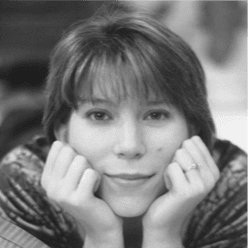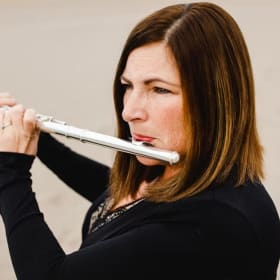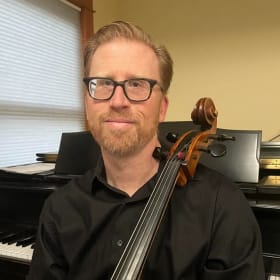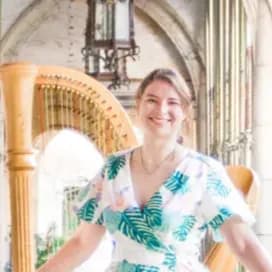
Hosted by
Northwest Repertory Singers
About this event
Add a donation for Northwest Repertory Singers
$
Sponsor Concert Selections and Guest Artists for Carols and Lullabies: A Holiday Choral Concert
Before the Song Was Done (Sarah Quartel)
$500
Sarah Quartel, a leading choral composer of her generation, sensitively weaves a text by Sara Teasdale for choir and piano with the flowing sounds of compound meter—a musical device often associated with a gentle rocking motion. In this poem, the Christ-child is serenaded by shepherds, kings, and the host of heaven, falling asleep “before the song was done.” The words were simply too perfect for our concert theme of "Carols and Lullabies” to pass by! Published in 2023, this new carol is sure to gain popularity for years to come.
Candle Blessings (David Ludwig)
$500
“Candle Blessings” is from the Hanukkah Cantata of David Ludwig, a multi-movement choral work with instruments and narration commissioned by the Philadelphia Music Project for Choral Arts Philadelphia. This selection from the larger work is for sopranos and altos, a capella. Ludwig incorporates a beautiful, serene, chantlike melody for the beloved Hanukkah prayers, evoking a sense of wonder.
Carols and Lullabies (Conrad Susa)
$1,000
Conrad Susa’s magnificent Carols and Lullabies: Christmas in the Southwest was commissioned by legendary Minnesota-based choral conductor Phillip Brunelle as the New World’s companion piece to Benjamin Britten’s A Ceremony of Carols. NWRS most recently presented this cycle of eleven carols in 2015, and we are delighted to reintroduce them to you as part of our 25th anniversary season. The complete work of eleven carols will be performed, predominantly in Spanish with some carols and portions in English. The work achieves a stunning sense of place and atmosphere through the use of harp, marimba, and guitar.
Our featured guest artists, listed below are available for sponsorship further down this list:
Elizabeth Brown, guitar
Scott Fry, marimba
Elizabeth Landis, harp
Glory, Glory, Glory to the Newborn King (Moses Hogan)
$500
Moses Hogan (1957-2023) was among the most esteemed composer-arrangers of the African American spiritual and arguably the foremost caretaker of this art form’s legacy during his career. He adapts “Go Tell It on the Mountain” with original words and music (and a nod to other carols) in “Glory, Glory, Glory to the Newborn King.” This selection, full of joy and driving energy, concludes our December program.
I Wonder as I Wander (arr. Kyle S. Haugen)
$500
NWRS Artistic Director Kyle Haugen sets this wistful American carol for tenor and bass voices with piano accompaniment and cello soloist. The piece is part of an anthology collecting more than a dozen composers, published as the St. Olaf Choirbook for Men.
This setting evokes a sense of steady searching as the piano accompaniment drives forward the poem’s protagonist, until a sudden stop occurs. The cello provides musical commentary—virtuosic at times—for inner contemplation the protagonist’s words suggest, employing nearly the entire range of the instrument.
This selection features Matthew Kelzenberg, cello, who is available for sponsorship further down this list.
Shlof, Mayn Fegele (arr. Ryan Nowlin)
$500
This Yiddish lullaby, adapted by composer Ryan Nowlin with portions in English, is a crossover from non-sacred repertoire that wonderfully complements our program and its lullabies from around the world. The words can be traced to Odessa, and the melody originated in Russia. This setting features a piano accompaniment and soprano solo. Our program pairs this selection with the Austrian carol-lullaby, “Still, Still, Still.”
Silent Night (arr. Matthew Culloton)
$500
What holiday program dedicated to the season’s carols and lullabies could be complete without “Silent Night,” the most famous carol-lullaby of them all? Composed hastily one Christmas Eve in Austria when the organ was broken, this carol is perhaps the most widely known in the world. NWRS will present this recent choral setting, featuring harp and flute.
This selection features Elizabeth Landis, harp, and Tracy Doyle, flute. They are available for sponsorship further down this list.
Still, Still, Still (arr. Norman Luboff)
$500
“Still, Still, Still” is a 19th-century carol-lullaby featuring a melody from Salzburg, Austria. This setting is by Norman Luboff, who rose to fame in the middle of the 20th century through radio, television, and recordings. This piece is a study in simplicity (difficult for the composer to achieve!) as it evokes a music box in the piano accompaniment yet retains a sense of the profound or divine. In the 1990’s, the group Mannheim Steamroller covered Luboff’s arrangement, introducing it to a new generation.

Elizabeth Brown, guitar - Guest Artist
$500
Elizabeth Brown, guitar (learn more) is featured in Carols and Lullabies.
As head of the Guitar and Lute program at Pacific Lutheran University she is active throughout the Pacific Northwest as a solo and ensemble performer. Known for her musically passionate performances, she has given solo recitals and performed concertos throughout North America.

Tracy Doyle, flute - Guest Artist
$500
Tracy Doyle, flute (learn more), is featured in Silent Night.
She is Professor of Flute and Director of the School of Music at the University of Puget Sound. Advocacy, equity, and community engagement are at the heart of Tracy’s work as a musician, educator, and leader. Having taught at a variety of levels from elementary through college and beyond, her holistic philosophy of music inextricably links education with performance.

Scott Fry, marimba (learn more)
$500
Scott Fry, marimba (learn more) is featured in Carols and Lullabies.
Scott Fry is in the Director of Bands at Emerald Ridge High School in Puyallup, WA. He earned his MM in Instrumental Conducting at the UW and was a student of Timothy Salzman. Prior to his study at UW, he served as a graduate assistant at the University of Colorado, where he was co-director of the CU Campus, Concert, and Basketball bands.

Matthew Kelzenberg, cello - Guest Artist
$500
Matthew Kelzenberg, cello (learn more) is featured in I Wonder as I Wander.
Matthew has enjoyed a varied career as a cellist and pedagogue, on stages and in halls from the Banff Centre, Canada, to Teatro Colon in Buenos Aires, Argentina. He has been a member of the Tacoma Symphony, the Arizona Opera Orchestra, and the Filarmônica de Minas Gerais (Brazil), and he holds degrees in Music Performance from the University of Puget Sound and Arizona State University.

Elizabeth Landis, harp (learn more)
$500
Elizabeth Landis, harp (learn more) is featured in Carols and Lullabies and Silent Night.
Elizabeth “Liz” Landis is Principal Harpist of Symphony Tacoma and Northwest Sinfonietta. She has performed with the Seattle Symphony, Seattle Opera, Cincinnati Symphony, and many others, with festival appearances including Aspen and the Lancaster Festival as a Wilkes Fellow. Initially trained at Interlochen Arts Academy and then under renowned professors such as Judy Loman, Elizabeth Hainen, and Nancy Allen, and the iconic Heidi Lehwalder, Liz is equally dedicated to her teaching.
Did you know? We fundraise with Zeffy to ensure 100% of your purchase goes to our mission!